m1 unit1 Learning about language[上学期]
文档属性
| 名称 | m1 unit1 Learning about language[上学期] |
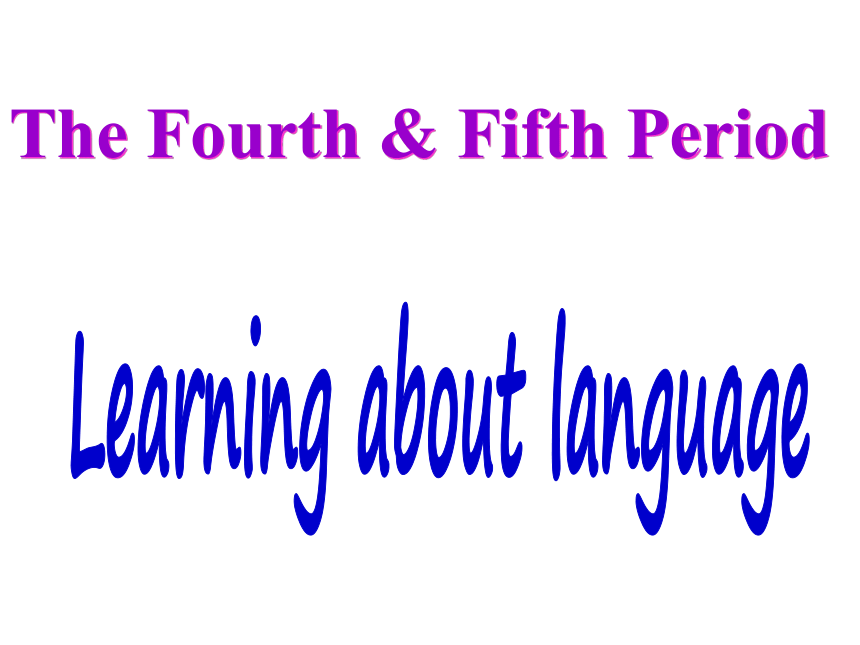
|
|
| 格式 | rar | ||
| 文件大小 | 693.9KB | ||
| 资源类型 | 教案 | ||
| 版本资源 | 通用版 | ||
| 科目 | 英语 | ||
| 更新时间 | 2006-10-21 00:00:00 | ||
图片预览

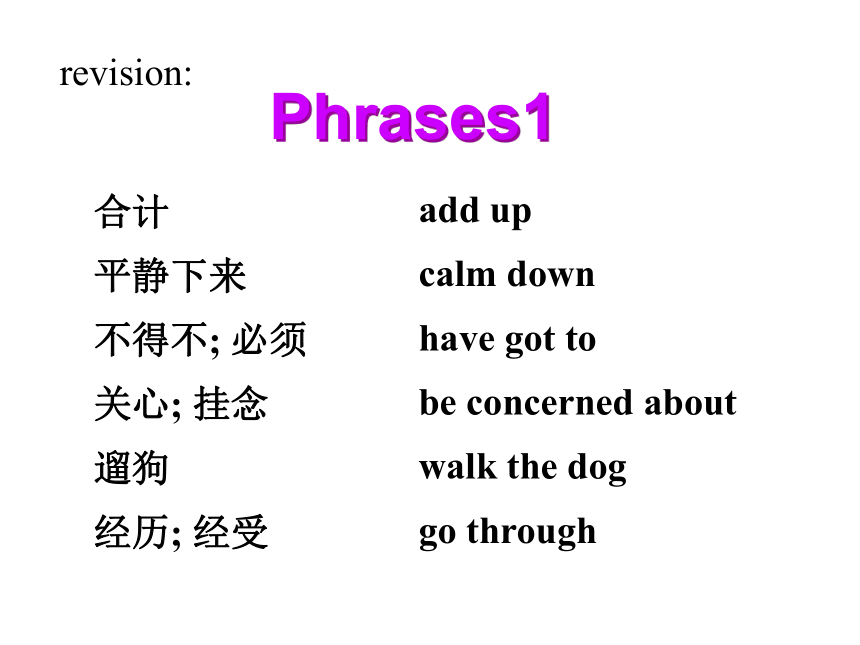
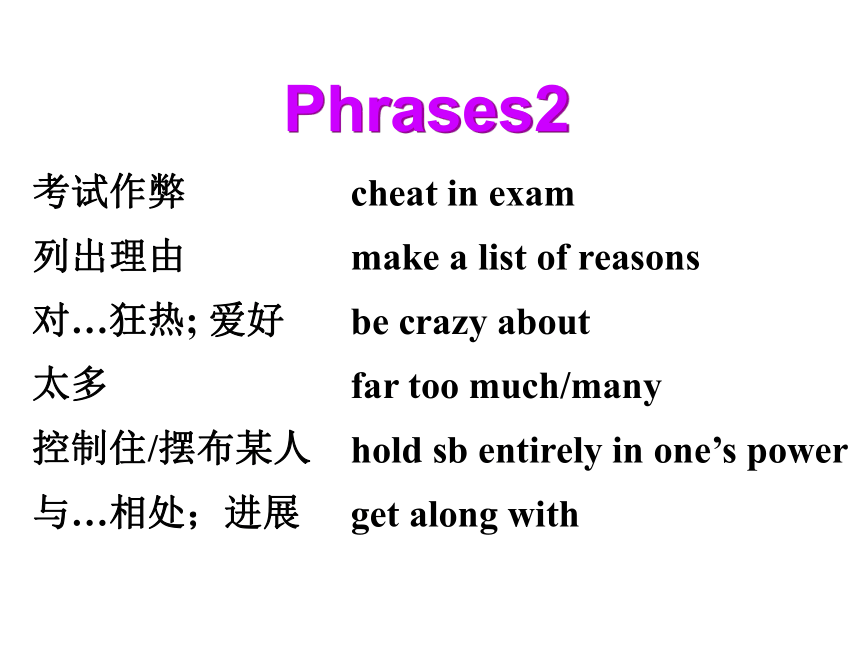
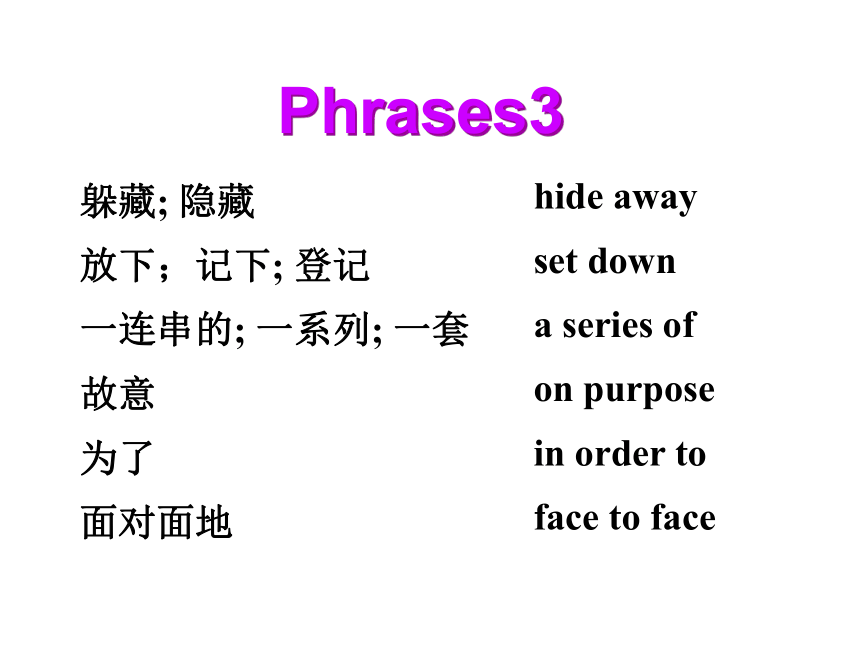
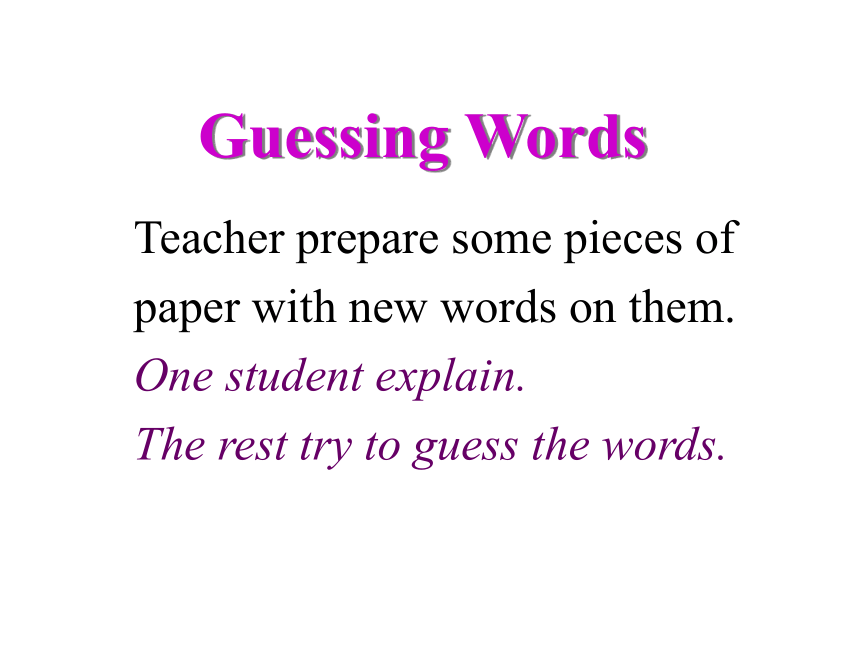
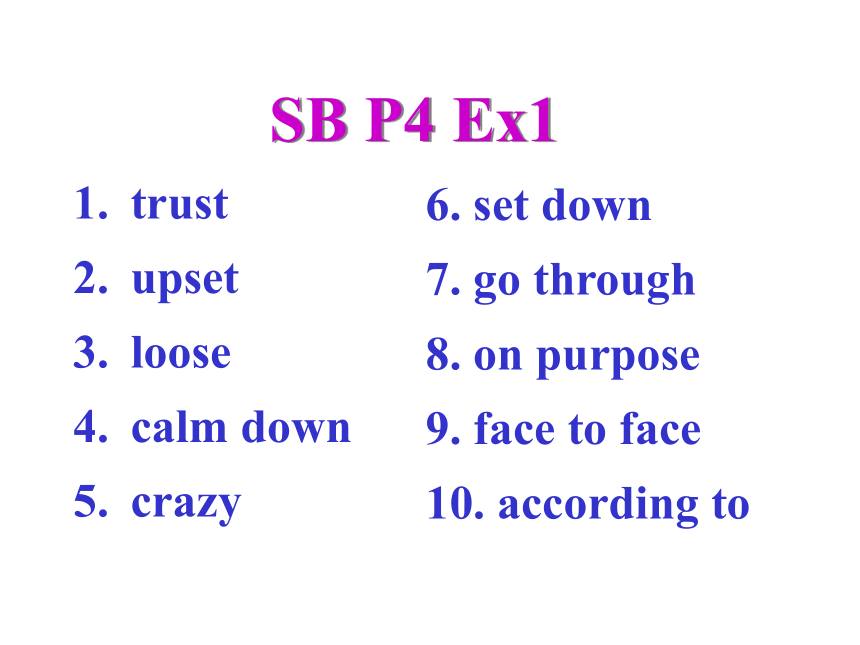
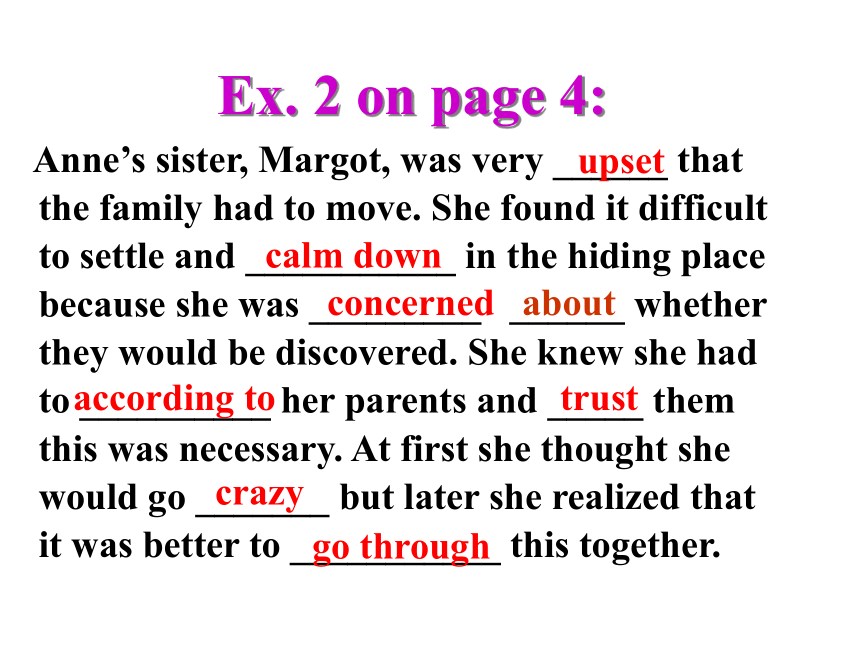

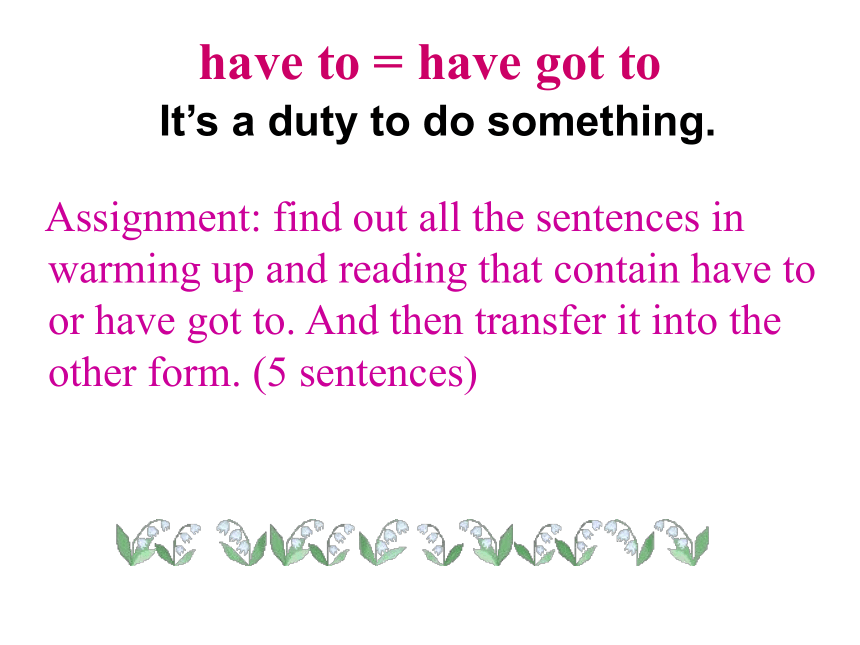
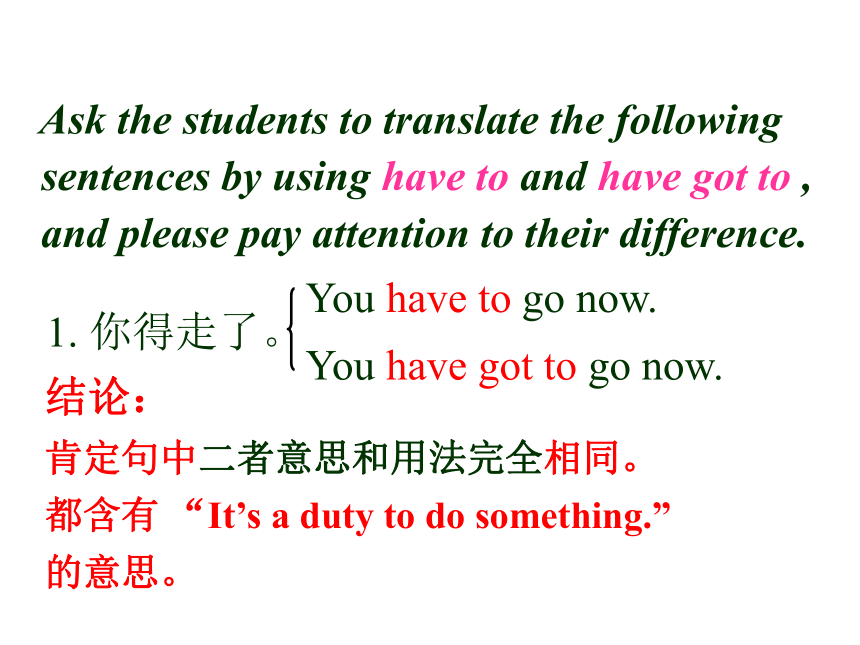
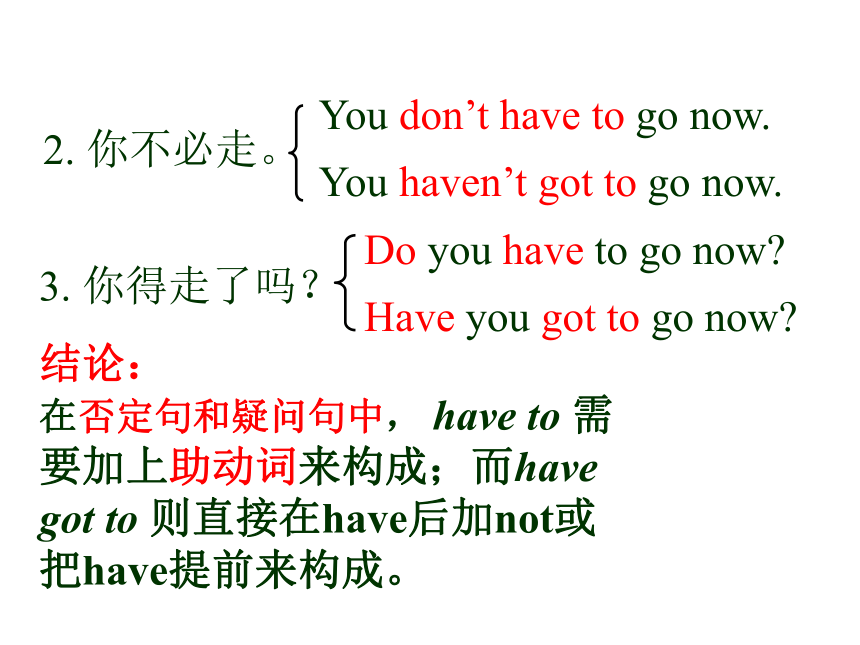

文档简介
课件57张PPT。The Fourth & Fifth PeriodLearning about languagePhrases1add up
calm down
have got to
be concerned about
walk the dog
go through合计
平静下来
不得不; 必须
关心; 挂念
遛狗
经历; 经受
revision:Phrases2cheat in exam
make a list of reasons
be crazy about
far too much/many
hold sb entirely in one’s power
get along with考试作弊
列出理由
对…狂热; 爱好
太多
控制住/摆布某人
与…相处;进展Phrases3hide away
set down
a series of
on purpose
in order to
face to face躲藏; 隐藏
放下;记下; 登记
一连串的; 一系列; 一套
故意
为了
面对面地Guessing WordsTeacher prepare some pieces of paper with new words on them.
One student explain.
The rest try to guess the words.SB P4 Ex1trust
upset
loose
calm down
crazy6. set down
7. go through
8. on purpose
9. face to face
10. according toEx. 2 on page 4: Anne’s sister, Margot, was very ______ that the family had to move. She found it difficult to settle and ___________ in the hiding place because she was _________ ______ whether they would be discovered. She knew she had to __________ her parents and _____ them this was necessary. At first she thought she would go _______ but later she realized that it was better to ___________ this together.upsetcalm downconcerned abouttrustaccording tocrazygo throughEx.3 on page 4:1. If you are _________ about somebody, you want to
offer help because you are worried about him/her.
2. Was it an accident or did David do it on _______?
3. From the very beginning, Paul made it clear that he
would be ________ in control.
4. He used to work ________ even in the middle of winter.
5. ______ is all the animals, plants and other things
in the world that are not made by people, and
all the events that are not caused by people.
6. Just the _______ of more food made her
feel sick.
concernedpurposeentirelyoutdoors Naturethoughthave to = have got to Assignment: find out all the sentences in warming up and reading that contain have to or have got to. And then transfer it into the other form. (5 sentences)
It’s a duty to do something. Ask the students to translate the following sentences by using have to and have got to , and please pay attention to their difference. You have to go now.
You have got to go now.
1. 你得走了。结论:
肯定句中二者意思和用法完全相同。
都含有 “It’s a duty to do something.”的意思。 3. 你得走了吗?2. 你不必走。You don’t have to go now.
You haven’t got to go now.
Do you have to go now?
Have you got to go now?结论:
在否定句和疑问句中, have to 需要加上助动词来构成;而have got to 则直接在have后加not或
把have提前来构成。WB P41 Ex1:1. trust, concerned, calm down,
in order to
2. share, thoughts, upsets, feelings
3. on purpose
4. crazy, share, cheats
5. has gone through
1. They hid there for almost two years and never dared go out.
2. We tried to calm him down, but he kept shouting.
3. Don’t laugh at him. Sometimes you are not able to do as well as he (does).
4. In the early 20th century, China went through too many wars.
5. The children haven’t been outdoors all day. Let them play outdoors for a while.
6. Please use the word to make a sentence according to the situation given.
7. This series of readers is very interesting.
8. The man saved the girl from the river and
her mother was very grateful.
9. Mr Jones lives alone and often feels lonely.
10. We communicate with each other by Internet.WB P41 Ex2:直接引语和间接引语Direct and Indirect SpeechThe shoes are too big for me.What did he say?He said the shoes were too big for him.基本概念直接引述别人的原话。通常都用引号“”括起来。用自己的话把别人的话转述出来。间接引语在多数情况下都构成一个宾语从句。
直接引语间接引语直接引语
和间接引语PresentationBoys act one cartoon figure and says something.
Teacher asks “What did he/she say?”
Girls act the other cartoon figure and answer the teacher’s question.
Then boys and girls exchange.She said she had been to many countries.She said she would call on you the next day.I am good at dancing.I have been to many countries.I will call on you tomorrow.I visited the Great Wall yesterday.She said she had visited the Great Wall the day before.She said she was good at dancing.结论一直接引语是陈述句,变为间接引语时用连词that引导宾语从句.从句中的人称,时态,指示代词,时间状语,地点状语等相应变化.解题步骤:1.陈述句:“I don’t like computers,” Sarah said to her friends.Sarah said to her friendsthat saiddidn’tsheSarah said to her friends that she didn’t like computers.SarahDo you like flowers?She asked me whether/if I liked flowers?Where are you going for your holiday?She asked me where I were going for my holiday.结论二直接引语是疑问句,变间接引语时,要从疑问语序变为陈述语序。
直接引语是一般疑问句,变为间接引语时,用连词if或whether连接。
直接引语是特殊疑问句,变为间接引语时,仍用原来的疑问词作连词来引导。
2.一般疑问句:
Is it easy to improve the condition of the soil?
( They asked him )They asked himifIt is easy to improve the condition of the soil.it is easy to improve the condition of the soil.askediswasThey asked him if it was easy to improve the condition of the soil.3.特殊疑问句:
When do you harvest the wheat ?
( They asked him )They asked himWhenyou harvest the wheatyou harvest the wheat.heharvestedThey asked him when he harvested the wheat.He ordered/told me to be quiet!Be quiet!He ordered/told me not to make noise.Don’t make noise!Follow me, please!He asked me to follow him.结论三直接引语是祈使句,变成间接引语,把动词原形变成动词不定式,否定句,在动词不定式前加not或never.
并根据语气的不同在动词不定前加tell, ask, order ,beg ,advise等动词。
1、人称的变化一
随
主二随宾第三
人称
不变
引号内的第一人
称变间引后与主
句主语的人称保
持一致引号内的第二人
称变间引后与主
句宾语的人称保
持一致引号内的第三人
称在变间引后人
称不变She said,“ I like
Tennis.”She said that she
liked tennis.He said to Lily,
“ you must get
up early.”He told Lily that
she must get up
early.She said to me ,
“ They want to
help him.”She told me that
they wanted to
help him.:一随主,二随宾,第三人称不更新直接引语 间接引语
一般现在时 一般过去时 现在进行时 过去进行时一般过去时 过去完成时现在完成时 过去完成时一般将来时 过去将来时The teacher said, “ The sun is bigger than the earth.”
The teacher said that the sun is bigger than the earth.
特殊: 直接引语若是客观真理,变为间接引语时,时态不变.2、时态的变化 直接引语 间接引语
指示代词 时 间 状 语 地点状语 方向性动词 this, that, these those
now, then, today that day
this week that week yesterday the day before
last week the week before
four days ago four days before the day before yesterday two days before
tomorrow the next day
next month the next month
here there
come, go,bring take 、其他特殊变化3注意事项1)人称
2)时态
3)相应的时间地点状语
4)标点符号
5)大小写
6)问号改为句号
7)语序---疑问改陈述
8)宾语从句由什么引出
9)祈使句要使用动词不定式
来引述Role PlayGroup work. Three students a group. One says something (please try to use the words and expressions learned in this unit), one asks, the third told the rest students what they said in Indirect Speech.4. “Why were you late again?” The teacher said to me.
The teacher asked me why I was late again.实战演练1. He said , “I m afraid I can’t finish this work.”2.He said , “I haven’t heard from him since May.”
3.Tom said “I will see you next week.”
He said that he were afraid he couldn’t finish that work.He said that he hadn’t heard from him since May.Tom said that he would see me the next week.Sarah said she didn’t like swimming.5. “I don’t like swimming,” said Sarah.The teacher said,“Don’t be late,Mary. ”
The teacher told ____.
? A. Mary not to be late
B. Mary to be not late??????
C. Mary are not late?? D. not to be late
2. He asked her,“Where are you going?”
He asked her ____.
A. where she were going????
B. where she was going to
C. where she was going??
D. where she is going巩固提高3. The lady said,“I shall go there on time. ”
The lady said that ____.
????A. she would come there on time????
B. she would come here on time
????C. she would got here on time????
D. he would got here on time
4. He said to me,“I wrote to my father
yesterday. ”
He told me he had written to his father ____.
???A. the yesterday???? B. before today????????
C. the day before D. the next day5. The teacher asked,“Are you waiting for the bus?”
The teacher asked ____ for the bus.
????A. if I was waiting?? B. was I waiting
C. you are waiting???????? D. I was waiting
6. The professor said that light ____ faster than sound.
????A. travels???? B. traveled????????
C. travel D. traveled
7. My mother asked me to show my homework to her.
My mother said to me,“Show ____ homework. ”
????A. her my?????????? B. me your????????
C. her your??????? ? D. me his8. It’s hard for me to imagine what I would be doing today if I ______ in love, at the age of seven, with the Melinda Cox Library in my hometown.
A. wouldn’t have fallen B. had not fallen
C. should fall D. were to fall
9. I wonder how he ____ that to the teacher.
A. dare to say B. dare saying
C. not dare say D. dared say
HOMEWORK1. SB P5Exx1,2
2. Go over what we learnt today.
3. Work in groups of four. Design a questionnaire to find out what kind of friends your classmates are. (optional)
RevisionGrammar: Direct and Indirect Speech (1)转述他人的陈述→陈述句→ She asked me what I was doing.1) He said , “I’m going to Beijing.”→ He said that he was going to Beijing.2) He asked, “Are you a teacher?”→ He asked me if /whether I was a doctor.3) She said , “What are you doing?”2. 转述他人的疑问→一般疑问句3. 转述他人的问题→特殊疑问句 直接引语变成间接引语,句子结构的变化
He said, “I have been to the Great Wall. ”
He said to us that he had been to the Great Wall.
He said, “I'll give you an examination next Monday. ”
He told us that he would give us an examination the next Monday. 陈述句
用连词that引导,that在口语中常省略。主句的谓语动词可直接用引语中的said, 也可用told来代替,注意,可以说said that, said to sb. that, told sb. that,不可直接说told that
一般疑问句 He said, “Do you have any difficulty with pronunciation?”
He asked (me) whether/if I had any difficulty with my pronunciation.
He said, “You are interested in English, aren't you?”
He asked whether I was interested in English. 间接引语用连词whether或if引导,原主句中谓语动词said要改为asked(me/him/us等),语序是陈述句的语序
特殊疑问句 He said to me,“What's your name?”
He asked me what my name was.
He asked us, “How many car factories have been built in your country?”
He asked us how many car factories had been built in our country. 原来的疑问词作为间接引语的连词,主句的谓语动词用ask(sb. )来表达,语序改为陈述句语序
选择疑问句 He asked, “Do you speak English or French?”
He asked me whether I spoke English or French.
I asked, “Will you take bus or take train?”
I asked him whether he would take bus or take train. 用whether…or…表达,而不用if…or…,也不用either…or…
直接引语 间接引语
指示代词 时 间 状 语 地点状语 方向性动词 this, that, these those
now, then, today that day
this week that week yesterday the day before
last week the week before
four days ago four days before the day before yesterday two days before
tomorrow the next day
next month the next month
here there
come, go,bring take 5. 注意地点的变化在直接引语变为间接引语时需要注意的变化1. 注意时态的变化2. 注意人称变化。3. 注意指示代词的变化4. 注意时间的变化6. 注意个别趋向动词的变化When you change a sentence from direct speech to indirect speech, you sometimes need to change the verb tense. You may also need to change pronouns , time in order to keep the same meaning.Direct indirect
Present past
Past past and past perfect
Present perfect past perfect
Past perfect past perfectThe geography teacher told us that the sun rises in the east and sets in the west.谓语动词时态变化需要注意几点:1.直接引语表述的是客观真理,变为间接引语时,时态不变The geography teacher said, “The sun rises in the east and sets in the west.”She says that she’ll never forget the days in the country.2. 如果直接引语所表述的内容在目前和说话时同样有效,变间接引语时,时态可不变The children said, “We love this game.”They told us that they love that game.3.主句谓语动词的时态是现在时态,在引述时,时态不变。She says, “I’ll never forget the days in the country.”1. 当主句的谓语动词是将来时的时候
2. 当直接引语部分带有具体的过去时间状语时
3. 当直接引语中有以when, while引导的从句,表示过去的时间时
4. 当引语是谚语、格言时
5. 当直接引语中有情态动词should, would, could, had better, would rather, might, must, ought to, used to, need时 从句时态无须改变的还有以下情况:Exercises:1. He said , “I m afraid I can’t finish this work.”2.He said , “I haven’t heard from him since May.”
3.Tom said “I will see you next week.”
He said that he was afraid he couldn’t finish that work.He said that he hadn’t heard from him since May.Tom said that he would see me the next week.4. “Why were you late again?” The teacher said to me.
5. “I don’t like swimming,” said Sarah.
6. His friends asked him if he would go to Dalian.
7. “Have you been to Paris?” My classmate asked me.The teacher asked me why I was late again.Sarah said she didn’t like swimming.His friends asked him, “Will you go to Dalian?”My classmate asked me if I had been to Paris.Readers can ________ quite well without knowing the exact meaning of each word.
A. get over B. get in
C. get along D. get through高考链接C解析:答案C。本题主要考查具体语境中get短语的用法。全句意为:尽管读者不知道每个单词的确切含义,但他们能够很好得读懂,即读书进展得顺利,故用get along。2. It’s hard for me to imagine what I would be doing today if I ______ in love, at the age of seven, with the Melinda Cox Library in my hometown.
A. wouldn’t have fallen B. had not fallen
C. should fall D. were to fall高考链接B解析:答案B。本题考查了fall in love在虚拟语气中的应用,从标志性时间状语at the age of seven看,宾语从句内容意指过去。在虚拟语气结构中,若指过去,从句中动词形式用过去完成时,主句中谓语动词形式用would/should/might/ could/have done。3. Father went to his doctor for _______ about his heart trouble.
A. an advice B. advice
C. advices D. the advices高考链接B解析:答案B。Advice若作“忠告,劝告,建议”讲,无论什么情况下都不可数,故A、C、D各项均属错误。Advice前不能用不定冠词,但可被some,much,a lot of/lots of,a piece of,a bit of,a word of等修饰。4. I wonder how he ____ that to the teacher.
A. dare to say B. dare saying
C. not dare say D. dared say高考链接D解析:答案D。本题主要考查了dare作为情态动词和实义动词的基本用法。作为实义动词,dare有人称、数和时态的变化,故dare to say与主语he相悖;dare doing结构本身错误;dare的否定形式应为dare not do(情态动词)或don’t/doesn’t/didn’t dare (实义动词) to do。 Homework Review the knowledge of direct speech and indirect speech and summarize the rules.
calm down
have got to
be concerned about
walk the dog
go through合计
平静下来
不得不; 必须
关心; 挂念
遛狗
经历; 经受
revision:Phrases2cheat in exam
make a list of reasons
be crazy about
far too much/many
hold sb entirely in one’s power
get along with考试作弊
列出理由
对…狂热; 爱好
太多
控制住/摆布某人
与…相处;进展Phrases3hide away
set down
a series of
on purpose
in order to
face to face躲藏; 隐藏
放下;记下; 登记
一连串的; 一系列; 一套
故意
为了
面对面地Guessing WordsTeacher prepare some pieces of paper with new words on them.
One student explain.
The rest try to guess the words.SB P4 Ex1trust
upset
loose
calm down
crazy6. set down
7. go through
8. on purpose
9. face to face
10. according toEx. 2 on page 4: Anne’s sister, Margot, was very ______ that the family had to move. She found it difficult to settle and ___________ in the hiding place because she was _________ ______ whether they would be discovered. She knew she had to __________ her parents and _____ them this was necessary. At first she thought she would go _______ but later she realized that it was better to ___________ this together.upsetcalm downconcerned abouttrustaccording tocrazygo throughEx.3 on page 4:1. If you are _________ about somebody, you want to
offer help because you are worried about him/her.
2. Was it an accident or did David do it on _______?
3. From the very beginning, Paul made it clear that he
would be ________ in control.
4. He used to work ________ even in the middle of winter.
5. ______ is all the animals, plants and other things
in the world that are not made by people, and
all the events that are not caused by people.
6. Just the _______ of more food made her
feel sick.
concernedpurposeentirelyoutdoors Naturethoughthave to = have got to Assignment: find out all the sentences in warming up and reading that contain have to or have got to. And then transfer it into the other form. (5 sentences)
It’s a duty to do something. Ask the students to translate the following sentences by using have to and have got to , and please pay attention to their difference. You have to go now.
You have got to go now.
1. 你得走了。结论:
肯定句中二者意思和用法完全相同。
都含有 “It’s a duty to do something.”的意思。 3. 你得走了吗?2. 你不必走。You don’t have to go now.
You haven’t got to go now.
Do you have to go now?
Have you got to go now?结论:
在否定句和疑问句中, have to 需要加上助动词来构成;而have got to 则直接在have后加not或
把have提前来构成。WB P41 Ex1:1. trust, concerned, calm down,
in order to
2. share, thoughts, upsets, feelings
3. on purpose
4. crazy, share, cheats
5. has gone through
1. They hid there for almost two years and never dared go out.
2. We tried to calm him down, but he kept shouting.
3. Don’t laugh at him. Sometimes you are not able to do as well as he (does).
4. In the early 20th century, China went through too many wars.
5. The children haven’t been outdoors all day. Let them play outdoors for a while.
6. Please use the word to make a sentence according to the situation given.
7. This series of readers is very interesting.
8. The man saved the girl from the river and
her mother was very grateful.
9. Mr Jones lives alone and often feels lonely.
10. We communicate with each other by Internet.WB P41 Ex2:直接引语和间接引语Direct and Indirect SpeechThe shoes are too big for me.What did he say?He said the shoes were too big for him.基本概念直接引述别人的原话。通常都用引号“”括起来。用自己的话把别人的话转述出来。间接引语在多数情况下都构成一个宾语从句。
直接引语间接引语直接引语
和间接引语PresentationBoys act one cartoon figure and says something.
Teacher asks “What did he/she say?”
Girls act the other cartoon figure and answer the teacher’s question.
Then boys and girls exchange.She said she had been to many countries.She said she would call on you the next day.I am good at dancing.I have been to many countries.I will call on you tomorrow.I visited the Great Wall yesterday.She said she had visited the Great Wall the day before.She said she was good at dancing.结论一直接引语是陈述句,变为间接引语时用连词that引导宾语从句.从句中的人称,时态,指示代词,时间状语,地点状语等相应变化.解题步骤:1.陈述句:“I don’t like computers,” Sarah said to her friends.Sarah said to her friendsthat saiddidn’tsheSarah said to her friends that she didn’t like computers.SarahDo you like flowers?She asked me whether/if I liked flowers?Where are you going for your holiday?She asked me where I were going for my holiday.结论二直接引语是疑问句,变间接引语时,要从疑问语序变为陈述语序。
直接引语是一般疑问句,变为间接引语时,用连词if或whether连接。
直接引语是特殊疑问句,变为间接引语时,仍用原来的疑问词作连词来引导。
2.一般疑问句:
Is it easy to improve the condition of the soil?
( They asked him )They asked himifIt is easy to improve the condition of the soil.it is easy to improve the condition of the soil.askediswasThey asked him if it was easy to improve the condition of the soil.3.特殊疑问句:
When do you harvest the wheat ?
( They asked him )They asked himWhenyou harvest the wheatyou harvest the wheat.heharvestedThey asked him when he harvested the wheat.He ordered/told me to be quiet!Be quiet!He ordered/told me not to make noise.Don’t make noise!Follow me, please!He asked me to follow him.结论三直接引语是祈使句,变成间接引语,把动词原形变成动词不定式,否定句,在动词不定式前加not或never.
并根据语气的不同在动词不定前加tell, ask, order ,beg ,advise等动词。
1、人称的变化一
随
主二随宾第三
人称
不变
引号内的第一人
称变间引后与主
句主语的人称保
持一致引号内的第二人
称变间引后与主
句宾语的人称保
持一致引号内的第三人
称在变间引后人
称不变She said,“ I like
Tennis.”She said that she
liked tennis.He said to Lily,
“ you must get
up early.”He told Lily that
she must get up
early.She said to me ,
“ They want to
help him.”She told me that
they wanted to
help him.:一随主,二随宾,第三人称不更新直接引语 间接引语
一般现在时 一般过去时 现在进行时 过去进行时一般过去时 过去完成时现在完成时 过去完成时一般将来时 过去将来时The teacher said, “ The sun is bigger than the earth.”
The teacher said that the sun is bigger than the earth.
特殊: 直接引语若是客观真理,变为间接引语时,时态不变.2、时态的变化 直接引语 间接引语
指示代词 时 间 状 语 地点状语 方向性动词 this, that, these those
now, then, today that day
this week that week yesterday the day before
last week the week before
four days ago four days before the day before yesterday two days before
tomorrow the next day
next month the next month
here there
come, go,bring take 、其他特殊变化3注意事项1)人称
2)时态
3)相应的时间地点状语
4)标点符号
5)大小写
6)问号改为句号
7)语序---疑问改陈述
8)宾语从句由什么引出
9)祈使句要使用动词不定式
来引述Role PlayGroup work. Three students a group. One says something (please try to use the words and expressions learned in this unit), one asks, the third told the rest students what they said in Indirect Speech.4. “Why were you late again?” The teacher said to me.
The teacher asked me why I was late again.实战演练1. He said , “I m afraid I can’t finish this work.”2.He said , “I haven’t heard from him since May.”
3.Tom said “I will see you next week.”
He said that he were afraid he couldn’t finish that work.He said that he hadn’t heard from him since May.Tom said that he would see me the next week.Sarah said she didn’t like swimming.5. “I don’t like swimming,” said Sarah.The teacher said,“Don’t be late,Mary. ”
The teacher told ____.
? A. Mary not to be late
B. Mary to be not late??????
C. Mary are not late?? D. not to be late
2. He asked her,“Where are you going?”
He asked her ____.
A. where she were going????
B. where she was going to
C. where she was going??
D. where she is going巩固提高3. The lady said,“I shall go there on time. ”
The lady said that ____.
????A. she would come there on time????
B. she would come here on time
????C. she would got here on time????
D. he would got here on time
4. He said to me,“I wrote to my father
yesterday. ”
He told me he had written to his father ____.
???A. the yesterday???? B. before today????????
C. the day before D. the next day5. The teacher asked,“Are you waiting for the bus?”
The teacher asked ____ for the bus.
????A. if I was waiting?? B. was I waiting
C. you are waiting???????? D. I was waiting
6. The professor said that light ____ faster than sound.
????A. travels???? B. traveled????????
C. travel D. traveled
7. My mother asked me to show my homework to her.
My mother said to me,“Show ____ homework. ”
????A. her my?????????? B. me your????????
C. her your??????? ? D. me his8. It’s hard for me to imagine what I would be doing today if I ______ in love, at the age of seven, with the Melinda Cox Library in my hometown.
A. wouldn’t have fallen B. had not fallen
C. should fall D. were to fall
9. I wonder how he ____ that to the teacher.
A. dare to say B. dare saying
C. not dare say D. dared say
HOMEWORK1. SB P5Exx1,2
2. Go over what we learnt today.
3. Work in groups of four. Design a questionnaire to find out what kind of friends your classmates are. (optional)
RevisionGrammar: Direct and Indirect Speech (1)转述他人的陈述→陈述句→ She asked me what I was doing.1) He said , “I’m going to Beijing.”→ He said that he was going to Beijing.2) He asked, “Are you a teacher?”→ He asked me if /whether I was a doctor.3) She said , “What are you doing?”2. 转述他人的疑问→一般疑问句3. 转述他人的问题→特殊疑问句 直接引语变成间接引语,句子结构的变化
He said, “I have been to the Great Wall. ”
He said to us that he had been to the Great Wall.
He said, “I'll give you an examination next Monday. ”
He told us that he would give us an examination the next Monday. 陈述句
用连词that引导,that在口语中常省略。主句的谓语动词可直接用引语中的said, 也可用told来代替,注意,可以说said that, said to sb. that, told sb. that,不可直接说told that
一般疑问句 He said, “Do you have any difficulty with pronunciation?”
He asked (me) whether/if I had any difficulty with my pronunciation.
He said, “You are interested in English, aren't you?”
He asked whether I was interested in English. 间接引语用连词whether或if引导,原主句中谓语动词said要改为asked(me/him/us等),语序是陈述句的语序
特殊疑问句 He said to me,“What's your name?”
He asked me what my name was.
He asked us, “How many car factories have been built in your country?”
He asked us how many car factories had been built in our country. 原来的疑问词作为间接引语的连词,主句的谓语动词用ask(sb. )来表达,语序改为陈述句语序
选择疑问句 He asked, “Do you speak English or French?”
He asked me whether I spoke English or French.
I asked, “Will you take bus or take train?”
I asked him whether he would take bus or take train. 用whether…or…表达,而不用if…or…,也不用either…or…
直接引语 间接引语
指示代词 时 间 状 语 地点状语 方向性动词 this, that, these those
now, then, today that day
this week that week yesterday the day before
last week the week before
four days ago four days before the day before yesterday two days before
tomorrow the next day
next month the next month
here there
come, go,bring take 5. 注意地点的变化在直接引语变为间接引语时需要注意的变化1. 注意时态的变化2. 注意人称变化。3. 注意指示代词的变化4. 注意时间的变化6. 注意个别趋向动词的变化When you change a sentence from direct speech to indirect speech, you sometimes need to change the verb tense. You may also need to change pronouns , time in order to keep the same meaning.Direct indirect
Present past
Past past and past perfect
Present perfect past perfect
Past perfect past perfectThe geography teacher told us that the sun rises in the east and sets in the west.谓语动词时态变化需要注意几点:1.直接引语表述的是客观真理,变为间接引语时,时态不变The geography teacher said, “The sun rises in the east and sets in the west.”She says that she’ll never forget the days in the country.2. 如果直接引语所表述的内容在目前和说话时同样有效,变间接引语时,时态可不变The children said, “We love this game.”They told us that they love that game.3.主句谓语动词的时态是现在时态,在引述时,时态不变。She says, “I’ll never forget the days in the country.”1. 当主句的谓语动词是将来时的时候
2. 当直接引语部分带有具体的过去时间状语时
3. 当直接引语中有以when, while引导的从句,表示过去的时间时
4. 当引语是谚语、格言时
5. 当直接引语中有情态动词should, would, could, had better, would rather, might, must, ought to, used to, need时 从句时态无须改变的还有以下情况:Exercises:1. He said , “I m afraid I can’t finish this work.”2.He said , “I haven’t heard from him since May.”
3.Tom said “I will see you next week.”
He said that he was afraid he couldn’t finish that work.He said that he hadn’t heard from him since May.Tom said that he would see me the next week.4. “Why were you late again?” The teacher said to me.
5. “I don’t like swimming,” said Sarah.
6. His friends asked him if he would go to Dalian.
7. “Have you been to Paris?” My classmate asked me.The teacher asked me why I was late again.Sarah said she didn’t like swimming.His friends asked him, “Will you go to Dalian?”My classmate asked me if I had been to Paris.Readers can ________ quite well without knowing the exact meaning of each word.
A. get over B. get in
C. get along D. get through高考链接C解析:答案C。本题主要考查具体语境中get短语的用法。全句意为:尽管读者不知道每个单词的确切含义,但他们能够很好得读懂,即读书进展得顺利,故用get along。2. It’s hard for me to imagine what I would be doing today if I ______ in love, at the age of seven, with the Melinda Cox Library in my hometown.
A. wouldn’t have fallen B. had not fallen
C. should fall D. were to fall高考链接B解析:答案B。本题考查了fall in love在虚拟语气中的应用,从标志性时间状语at the age of seven看,宾语从句内容意指过去。在虚拟语气结构中,若指过去,从句中动词形式用过去完成时,主句中谓语动词形式用would/should/might/ could/have done。3. Father went to his doctor for _______ about his heart trouble.
A. an advice B. advice
C. advices D. the advices高考链接B解析:答案B。Advice若作“忠告,劝告,建议”讲,无论什么情况下都不可数,故A、C、D各项均属错误。Advice前不能用不定冠词,但可被some,much,a lot of/lots of,a piece of,a bit of,a word of等修饰。4. I wonder how he ____ that to the teacher.
A. dare to say B. dare saying
C. not dare say D. dared say高考链接D解析:答案D。本题主要考查了dare作为情态动词和实义动词的基本用法。作为实义动词,dare有人称、数和时态的变化,故dare to say与主语he相悖;dare doing结构本身错误;dare的否定形式应为dare not do(情态动词)或don’t/doesn’t/didn’t dare (实义动词) to do。 Homework Review the knowledge of direct speech and indirect speech and summarize the rules.
